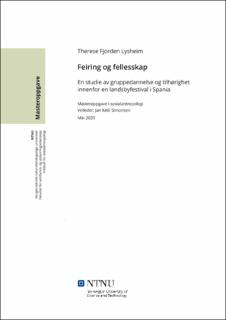| dc.description.abstract | Denne oppgaven er en sosialantropologisk studie som stiller spørsmål ved hva slags grupper som dannes under en landsbyfestival i Spania og hva gruppene uttrykker i relasjon til tilhørighet. Påstanden er at gruppene uttrykker tilhørighet til fire ulike størrelser: Grupper med venner, landsbyen, regionen og nasjonen.
Feiringer står i kontrast til dagliglivets rutiner og oppgaver, og kan ha elementer ved seg som fremhever gruppetilhørighet og tilhørighet til landsbyen, regionen og nasjonen fremfor familien. Basert på deltagelse, observasjon og lokale utsagn, og ved hjelp av tidligere forskning, vil oppgaven vise hvordan en form for sosial organisering innenfor en festival kan forstås som rituell praksis med symbolske aspekter, selv om praksisen i utgangspunktet ikke er knyttet til religiøsitet.
Sosial organisering og feiring er to temaer som lenge har vært undersøkt og diskutert i faget, men peña finnes det derimot lite litteratur om. Peña er grupper med venner som tilbringer tid sammen under festivalen. Disse undersøkes som en praksis der communitas står sentralt, fordi medlemskap i en gruppe kan knyttes til egalitet gjennom for eksempel uniformering. Her blir også stedene gruppene benytter seg av under festivalen viktige, som emisk beskrives som «lånte hjem».
Victor Turners begreper struktur og antistruktur vil brukes for å argumentere for at selve festivalen både er stabil og ustabil sammenlignet med hverdagen. I tillegg kan også peña sies å være en motsats til dagliglivet, gjennom reversering av normer og vennerelasjoner som har høyere sosial signifikans enn familien. Som en sosial enhet har disse gruppene mange elementer som beskrives. Det blir tydelig at både objekter og adferd direkte knyttet til utøvelse av enheten kan beskrives som flertydige og meningsfulle på ulikt vis. Jeg argumenterer for at utøvelse av gruppene, samt generell deltagelse i festivalen med dens særegne praksiser, er med på å skape en følelse av tilhørighet til landsby, den autonome regionen og Spania som nasjon.
Til slutt vil mekanismer bak opplevelsen av gruppetilhørighet undersøkes, og forklares med blant annet situasjonelle regler, en generell lokal holdning som er til stede både innenfor festivalomgivelsene og i dagliglivet, og reversering av normer. Turners begreper struktur, antistruktur og communitas bidrar også på disse områdene til en forståelse for at reversering av normer og reduksjon av familiens betydning ikke er problematisk når antistruktur blir et avbrekk i fra hverdagens plikter og normer. | |
| dc.description.abstract | This thesis is a social anthropological study which questions what kinds of groups are being formed during a village festival in Spain and what these groups are expressing in relation to belonging. The claim is that the groups express belonging within four different levels: Groups of friends, the village, the region, and the nation.
Celebrations are contrasted with the routines and tasks of everyday life, and therefore have elements that accentuate group belonging and local rooting within the village, the region and the nation as opposed to the family. Based on participation, observation, and local statements, together with comparative studies of festivals, the thesis shows how a form of social organization within a festival could be understood as ritual practice containing symbolic aspects, although the practice is not originally religious.
Social organization and celebration are two themes studied and discussed for a long time within the field, but as for the organizational form peña few studies have been done. Peña is a group of friends spending time together during the festival. These are examined here as a practice in which the term communitas is key because membership of a group can be tied to egalitarianism, for instance through uniform clothing. Another important aspect is the places that the groups use during the festival, in an emic perspective described as «borrowed homes».
Victor Turner’s terms structure and anti-structure will also be used to argue that the festival itself is both stable and unstable compared to everyday life. Peña can also be contrary to daily life, through reversal of norms and a reduction of the social significance and role of the family. As social units, these groups have many elements that will be described. It will be clear that both objects and behavior directly connected with the performance of the groups could be described as ambiguous and meaningful in different ways. It is argued that execution of groups, as well as general participation in the festival with its unique practices, is contributing to a sense of belonging in village, the autonomous region and Spain as a nation.
Finally, the mechanisms behind the experience of groups belonging be examined and explained with, among other things, situational rules, a general, local mentality which is present both during the festival and in everyday life, and reversal of norms. Again, Turners terms structure, anti-structure, and communitas will contribute to an understanding of how norm reversal and the reduction of the family’s significance is not problematic when anti-structure is a break from ordinary duties and norms. | |
